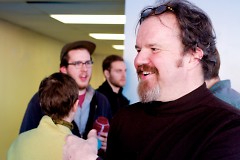The Office for Public Culture
428 Bridge Street NW
Grand Rapids, MI 49504
Office hours: Fridays from 3 - 5:30 p.m.
Facebook: Office for Public Culture

Paul Wittenbraker talks with event attendees /© Tommy Allen
428 Bridge Street NW
Grand Rapids, MI 49504
Office hours: Fridays from 3 - 5:30 p.m.
Facebook: Office for Public Culture

Paul Wittenbraker talks with event attendees /© Tommy Allen
What are today’s urban successes, challenges and crisis? And what can individual citizens acting within their rights to urban space do to meet the challenges and crisis of today?
Those questions were at the forefront of the “Right to the City” public discussion held the evening of February 21 at Bridge Street’s Office for Public Culture, where over 30 people convened to discuss social issues in Grand Rapids. Grand Valley State University associate professor Paul Wittenbraker initiated the forum, which critically examined the “dislodgment” of the DAAC and the fencing off of a Wealthy Street overpass abutment nearby the Downtown Market that was frequented by homeless people.
“This is about getting people together to build a collective and figure out what Right to the City means,” says culture worker and visual designer Krzysztof Lower, one of the discussion’s organizers. “I think the city forms us, and we form the city. If we don’t like how [the city’s] forming us we have a right to say something.”
“Right to the City” is a concept originated by French urbanist Henri Lefebvre as a “demand…[for] a transformed and renewed access to urban life,” according to Lefebvre’s essay. At the heart of the concept is an acknowledgement to individual rights to city resources without discrimination.
Issues identified by contributors as crises included racial disparities, a lack of shelters that are not faith-based and self-censorship when speaking out is uncomfortable.
“I need to take opportunities to speak,” says Grand Valley Professor of Civil Discourse Lisa Perhamus, who was in attendance. “I sort of cringe when I hear people referred to [with qualifiers] like ‘we, they, him, us’, or things like that. That’s how people get looked at in different ways. But I need to give voice to those thoughts. We need to re-imagine our use of language.”
Janay Brower, former leader of the Grand Rapids Area Coalition to End Homelessness, stresses that discussion concerning how Lefebvre’s concept can be applied to Grand Rapids is important.
“There are two ways to come at Right to the City,” says Brower. “There are those coming at it out of necessity, those who are oppressed, depressed and need tactics, or there are those who are discontent and want to challenge the city to the next level. I think it’s really important to have these dialogues on frameworks of what our city is doing.”
Wittenbraker says that the Office of Public Culture is not planning on solving all the city’s problems but said that he hoped it could be a public forum for creatively imagining what steps can be made to reduce social disparities in Grand Rapids.
“This is a lot about making social connections, but maybe also about forming a kernel of an idea,” says Wittenbraker.
More public discussions regarding the Right to the City are expected, but no dates have been set. Currently the Office of Public Culture at 428 Bridge Street is open from 3 – 5:30 p.m. every Friday, and visitors and inquisitors are welcome.
The Rapidian, a program of the 501(c)3 nonprofit Community Media Center, relies on the community’s support to help cover the cost of training reporters and publishing content.
We need your help.
If each of our readers and content creators who values this community platform help support its creation and maintenance, The Rapidian can continue to educate and facilitate a conversation around issues for years to come.
Please support The Rapidian and make a contribution today.